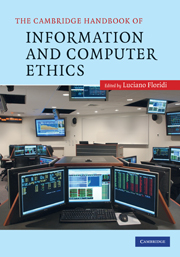Book contents
- Frontmatter
- Contents
- List of contributors
- Preface
- Acknowledgements
- Part I Introduction and background
- Part II Ethical approaches
- 3 Values in technology and disclosive computer ethics
- 4 The use of normative theories in computer ethics
- 5 Information ethics
- Part III Ethical issues in the information society
- Part IV Ethical issues in artificial contexts
- Part V Metaethics
- Epilogue: The ethics of the information society in a globalized world
- References
- Index
4 - The use of normative theories in computer ethics
Published online by Cambridge University Press: 05 June 2012
- Frontmatter
- Contents
- List of contributors
- Preface
- Acknowledgements
- Part I Introduction and background
- Part II Ethical approaches
- 3 Values in technology and disclosive computer ethics
- 4 The use of normative theories in computer ethics
- 5 Information ethics
- Part III Ethical issues in the information society
- Part IV Ethical issues in artificial contexts
- Part V Metaethics
- Epilogue: The ethics of the information society in a globalized world
- References
- Index
Summary
Introduction
Without Information and Communication Technologies (ICTs) many of the activities that we undertake in the twenty-first century in the world of trade, finance, transport, healthcare, science, education, administration, management, communication, energy supply, industrial production, defence, engineering and technology would be impossible. Computers have become a necessary condition for all of our large-scale projects and complex endeavours.
Some of the major moral problems of Information Societies at the beginning of the twenty-first century concern the quality and reliability of information, control and governance of the Internet, responsibility for data processing, property of software and privacy and protection of personal data and the quality of life. There are also problems concerning power and dominance of commercial parties, equal access and fair distribution of information. A relatively new set of issues concerns the way the technology invades our daily lives and affects the moral development of children and young people who have had long and intense exposure to the technology and the content it offers. This listing is not exhaustive and new issues are constantly appearing as the technology develops. The issues occupy a prominent place in public debates, demand attention in the policy arena and usually require regulation because the lives and interest of many are potentially affected. Computer and information ethics has tried to shed light upon these and other issues in the last decades.
Keywords
Information
- Type
- Chapter
- Information
- Publisher: Cambridge University PressPrint publication year: 2010
Accessibility standard: Unknown
Why this information is here
This section outlines the accessibility features of this content - including support for screen readers, full keyboard navigation and high-contrast display options. This may not be relevant for you.Accessibility Information
- 29
- Cited by
